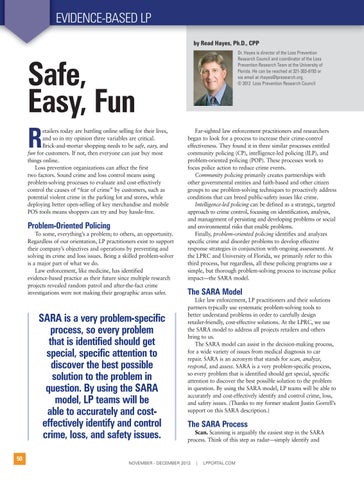EVIDENCE-BASED LP by Read Hayes, Ph.D., CPP Dr. Hayes is director of the Loss Prevention Research Council and coordinator of the Loss Prevention Research Team at the University of Florida. He can be reached at 321-303-6193 or via email at rhayes@lpresearch.org. © 2012 Loss Prevention Research Council
Safe, Easy, Fun R
etailers today are battling online selling for their lives, and so in my opinion three variables are critical. Brick-and-mortar shopping needs to be safe, easy, and fun for customers. If not, then everyone can just buy most things online. Loss prevention organizations can affect the first two factors. Sound crime and loss control means using problem-solving processes to evaluate and cost-effectively control the causes of “fear of crime” by customers, such as potential violent crime in the parking lot and stores, while deploying better open-selling of key merchandise and mobile POS tools means shoppers can try and buy hassle-free.
Problem-Oriented Policing
To some, everything’s a problem; to others, an opportunity. Regardless of our orientation, LP practitioners exist to support their company’s objectives and operations by preventing and solving its crime and loss issues. Being a skilled problem-solver is a major part of what we do. Law enforcement, like medicine, has identified evidence-based practice as their future since multiple research projects revealed random patrol and after-the-fact crime investigations were not making their geographic areas safer.
SARA is a very problem-specific process, so every problem that is identified should get special, specific attention to discover the best possible solution to the problem in question. By using the SARA model, LP teams will be able to accurately and costeffectively identify and control crime, loss, and safety issues. 50
LPM 1112-B.indd 50
Far-sighted law enforcement practitioners and researchers began to look for a process to increase their crime-control effectiveness. They found it in three similar processes entitled community policing (CP), intelligence-led policing (ILP), and problem-oriented policing (POP). These processes work to focus police action to reduce crime events. Community policing primarily creates partnerships with other governmental entities and faith-based and other citizen groups to use problem-solving techniques to proactively address conditions that can breed public-safety issues like crime. Intelligence-led policing can be defined as a strategic, targeted approach to crime control, focusing on identification, analysis, and management of persisting and developing problems or social and environmental risks that enable problems. Finally, problem-oriented policing identifies and analyzes specific crime and disorder problems to develop effective response strategies in conjunction with ongoing assessment. At the LPRC and University of Florida, we primarily refer to this third process, but regardless, all these policing programs use a simple, but thorough problem-solving process to increase police impact—the SARA model.
The SARA Model
Like law enforcement, LP practitioners and their solutions partners typically use systematic problem-solving tools to better understand problems in order to carefully design retailer-friendly, cost-effective solutions. At the LPRC, we use the SARA model to address all projects retailers and others bring to us. The SARA model can assist in the decision-making process, for a wide variety of issues from medical diagnosis to car repair. SARA is an acronym that stands for scan, analyze, respond, and assess. SARA is a very problem-specific process, so every problem that is identified should get special, specific attention to discover the best possible solution to the problem in question. By using the SARA model, LP teams will be able to accurately and cost-effectively identify and control crime, loss, and safety issues. (Thanks to my former student Justin Gorrell’s support on this SARA description.)
The SARA Process
Scan. Scanning is arguably the easiest step in the SARA process. Think of this step as radar—simply identify and
NOVEMBER - DECEMBER 2012
|
LPPORTAL.COM
12/3/12 2:19 PM







